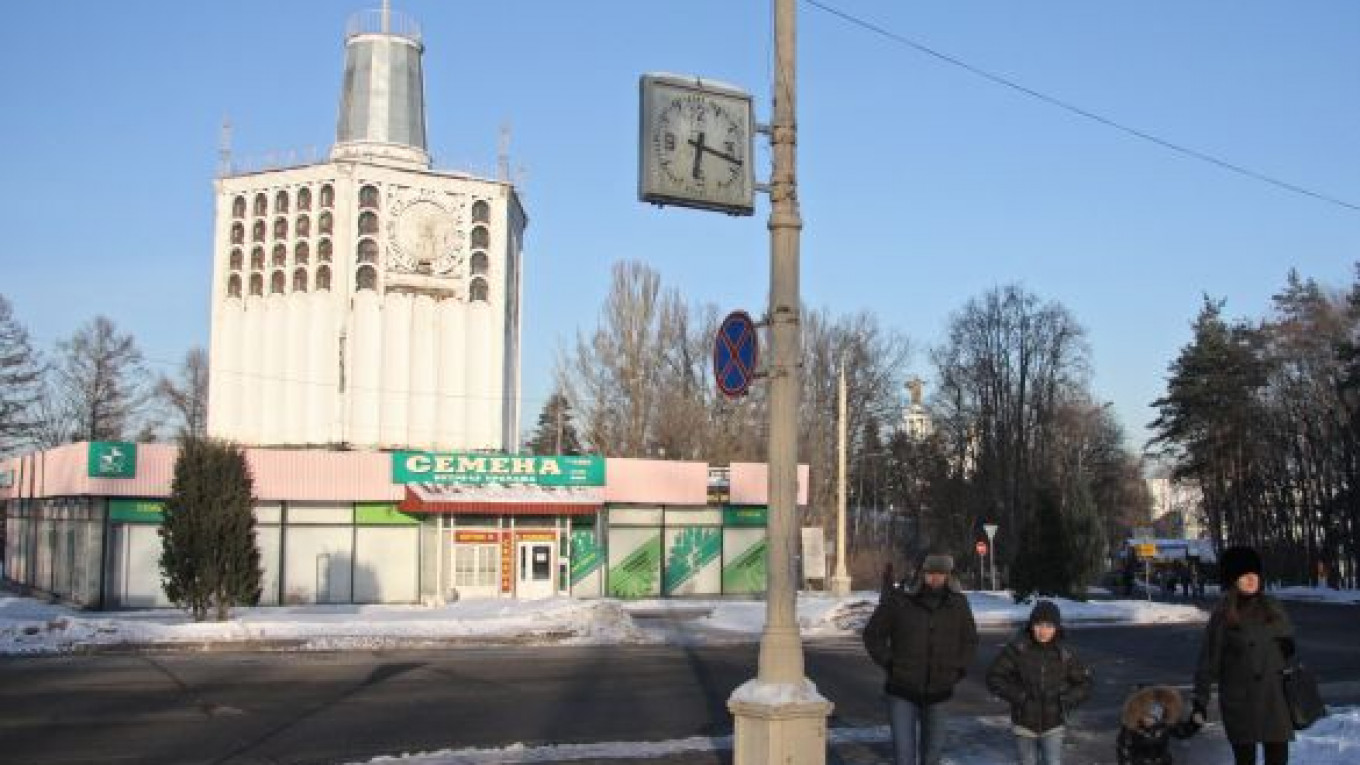Architectural preservation group Arkhnadzor has called for the All-Russia Exhibition Center, or VVTs — which they refer to as Moscow’s “Soviet Versailles” — to receive increased legal protection ahead of a $1.5 billion redevelopment expected to be approved by city authorities this spring.
The planned transformation of VVTs has prompted concerns from campaigners that the site’s aesthetic unity will be violated and valuable landmarks destroyed.
The company that controls the 236-hectare VVTs is 70 percent owned by the federal government and 30 percent by City Hall. Its director, Alexei Mikushko, publicly outlined the “rebirth” of the site in November and told The Moscow Times last week that building plans were expected to be finalized in 2012 and construction work would begin within 18 months.
During a news conference last week, Arkhnadzor activists compared VVTs to other great national exhibitions of the 19th and early 20th century that took place in London, New York and Paris. Unlike the VVTs, none of them have survived.
Activist Anna Bronovitskaya said there was no dialogue between Arkhnadzor and the VVTs company. Representatives of the company, including Mikushko, who attended the event said they were “surprised” not to have been formally invited.
The proposed redevelopment plans envisage the creation of five zones and the construction of an innovation campus, a large leisure complex, an underground parking lot and four-star hotels. “The exhibition will remain an exhibition,” Mikushko said last year. “But after the reconstruction, it will be clearly adapted for modern use.”
A key point of contention between preservationists and developers is the decision to change the heritage status of the VVTs to permit construction work. About $500 million of the budget for the project has been allocated for the renovation of existing buildings.
Arkhnadzor said that instead of a downgrade, the legal protection that VVTs now enjoys should be expanded. Of its more than 100 historically significant structures only 40 enjoy a protected status, activist Irina Trubetskaya said.
There are also specific concerns over a number of buildings on the edge of the site that represent a range of architectural styles and contrast with the Stalinist grandeur of the pavilions and fountains on the main walkway.
They include No.7 Seed Pavilion that sells bulbs, seeds and other gardening equipment. Natalya Duskina, professor at the Moscow Architecture Institute, said this was one of several examples of modernist architecture at the VVTs. Only about 11 percent of Moscow’s protected historical monuments are from the 20th century, she said, and called for all the modernist pavilions at VVTs to receive legal protection.
Under the current plans, which should be realized within six years, the Seed Pavilion falls under an area slated to become an enclosed leisure park.
Though Mikushko said Thursday that none of the redevelopment has been officially approved yet, a shop assistant in the Moskhlebtorg Pavilion — adjacent to the Seed Pavilion and also on land intended for the leisure park — who requested anonymity to talk to the press, said he had been warned he was likely to be required to vacate his premises by the summer.
Other workers in nearby pavilions told The Moscow Times that they were aware of discussions about the redevelopment plans, but had not been given a specific time frame.
“One must not develop the central walkway and restore its pavilions, which are of course very valuable, at the expense of the periphery,” said activist Trubetskaya.
The Kino-Panorama, a triumph of Khrushchev-era technology that shows films on twelve screens, is also on the planned site of the leisure center. It will be transformed into a state-of-the-art 5D cinema, Mikushko said.
A Message from The Moscow Times:
Dear readers,
We are facing unprecedented challenges. Russia's Prosecutor General's Office has designated The Moscow Times as an "undesirable" organization, criminalizing our work and putting our staff at risk of prosecution. This follows our earlier unjust labeling as a "foreign agent."
These actions are direct attempts to silence independent journalism in Russia. The authorities claim our work "discredits the decisions of the Russian leadership." We see things differently: we strive to provide accurate, unbiased reporting on Russia.
We, the journalists of The Moscow Times, refuse to be silenced. But to continue our work, we need your help.
Your support, no matter how small, makes a world of difference. If you can, please support us monthly starting from just $2. It's quick to set up, and every contribution makes a significant impact.
By supporting The Moscow Times, you're defending open, independent journalism in the face of repression. Thank you for standing with us.
Remind me later.







